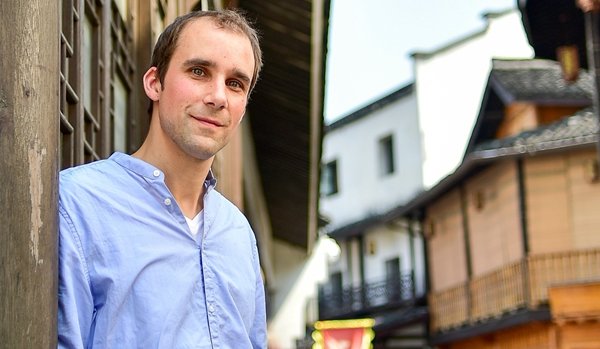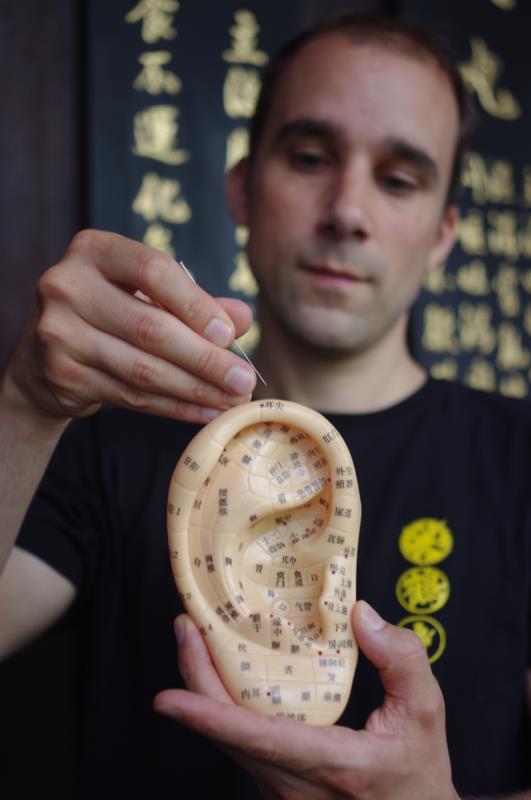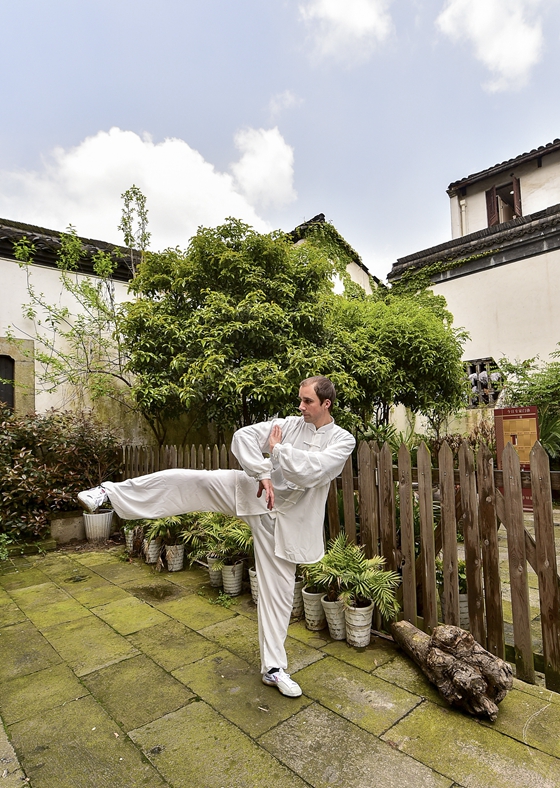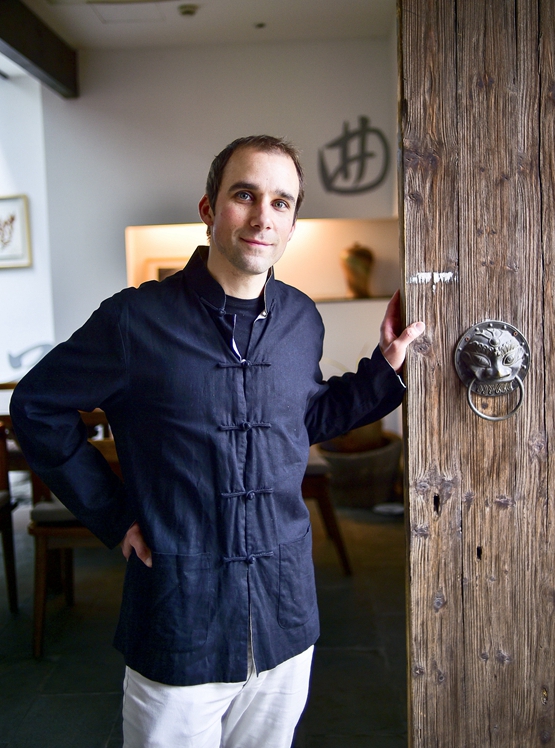Promoting Greater Understanding of TCM Culture in the World

"China has achieved greater influence globally, and people elsewhere in the world have become more aware of China's rich cultural heritage. China's reform and opening up has connected Chinese with people in the World. I hope China will continue making efforts to promote traditional Chinese medicine culture abroad," Tim Vukan, from Hamburg, Germany, says.
Vukan is an expert in traditional Chinese medicine (TCM), and the founder of Wushan TCM, an online education platform that presents TCM courses in three languages (English, German and Chinese). He is also a fan of Tai Chi, a centuries-old Chinese martial art focusing on both internal and external practices.

Passionate About TCM
Vukan became obsessed with Chinese Kung Fu after he watched some martial arts films starring Bruce Lee (1940-1973). He began learning Wing Chun, a traditional southern Chinese Kung Fu style, from a German teacher at 18, and he dreamed of one day visiting China. His dream came true in 2004 — he arrived in Central China's Henan Province to study martial arts.
Later, he moved to Yangshuo, in South China's Guangxi Zhuang Autonomous Region, to study Tai Chi. His teacher also taught him to speak Chinese, and helped him blend in with the locals.
Vukan noticed the many vendors who were selling Chinese herbs. He also travelled to Southwest China's Yunnan Province, where he began to develop a strong interest in TCM.
As he only had a tourist visa, Vukan stayed in China for about three months in 2004. But during that period of time, he decided he wanted to study TCM in China.
In 2005, he returned to China, to learn TCM at Zhejiang Chinese Medical University, in Hangzhou, capital of East China's Zhejiang Province. In 2015, he received his master's degree, in TCM, from the university.
To make TCM accessible to more people around the world, Vukan set up the online education platform, Wushan TCM (wushantcm.com), in 2008, through which he has offered online courses on TCM culture, especially information about yangsheng (nourishing life) and particular TCM therapies, such as acupuncture and herbal medicine.
"My mission is to popularize professional knowledge of TCM among foreigners, using a simple and easy-to-understand language, and from a Western perspective. Now, the website has thousands of registered members, including TCM practitioners and ordinary people around the world," Vukan says.
Vukan also uses social-media and short-video platforms to promote TCM culture. Compared with a decade ago, an increasing number of foreigners are interested in TCM, he says.
Vukan, who has been living in China for about 19 years, says TCM is an indispensable part of his life. "I will continue to promote greater understanding of TCM culture in the world, and I will help TCM benefit more people," he says.

Reform and Opening Up Brings China Closer to World
When talking about China's reform and opening up, Vukan says, "China has gone through complex changes, with strong economic modernization and social reform, toward an opening up and a greater influence with the whole world. The policy has made China achieve strong economic growth."
Vukan says it is especially interesting to see how his career has been influenced by China's reform and opening up.
"Looking back to 2005, when I started my Chinese medicine studies, at Zhejiang Chinese Medical University, I would not have thought that today I would have the honor to teach in front of Chinese undergraduate students, who are learning the theories and practical applications I also learned during the years of receiving my education. I can now see it as a journey, beginning with the first steps I made into the Chinese language, which also opened up my understanding about Chinese culture and philosophies," he says.
Learning the Chinese language has always been a tool that has helped Vukan connect with Chinese, and to gain a better understanding of the various fascinating facets of Chinese culture.
"Just like every Chinese person is trying to build up their dreams, this vision also became my reality when I started my studies in Chinese medicine. It took a lot of effort to follow the classes, which were held in Chinese. But, at the end of the day, it gave me a feeling of deep satisfaction," Vukan says.
"My teachers, and the doctors I followed in the clinic where I worked as an intern, treated me with respect, and they shared with me their deep knowledge about this fascinating ancient medicine. Likewise, in the West, people often contacted me to seek help, and to learn about the yangsheng cultivation methods I learned during my time in China," he adds.
China's reform and opening up has connected Chinese with people in the West, and, therefore, foreigners have become part of China's great development, he suggests.

Witnessing Urban Development
Vukan has witnessed the rapid development and increased internationalization of Hangzhou, which he considers his second hometown.
"Like many cities in China, Hangzhou over the years has become a very modern, metropolitan city. I still remember when the first Starbucks was built, in Binjiang District. It became our place to go, after our studies, to meet some friends, regain some energy and share our experiences of living abroad. I also often walked along West Lake, where each time young Chinese would send some greetings to me, and express their wishes to have some short English conversations with me," Vukan says.
"This has changed so much, that many international brands and companies have become a part of Hangzhou's development, and English, as a second language, has become natural for many young Chinese workers and employees," he adds.
Vukan says, in general, the quality of life in big cities, like Hangzhou, has increased a lot, and the cities have modern shopping malls and international brands, not to forget the development of traditional arts, like tea and herbal medicine, which are sold with a modern approach to balance the health needs of modern Chinese.
Sci-Tech Development Changes Lives
Vukan says he has been particularly impressed by the rapid development of science and technology, which have brought new changes to people's lives in China.
"Nowadays, digital solutions are a strong part of our lives. Ordering food, paying in a supermarket, calling for a taxi, or booking our next medical consultation, all can be performed with a mobile-app solution, to provide a better, faster, and more efficient way to serve the people," he says.
"Take medical services, for example; China has made better use of big data in ensuring and improving people's wellbeing, and in promoting 'Internet plus medical treatment' to make citizens' access to medical services more equitable and convenient. People can register on mobile apps before going to the hospital. Hospitals have introduced online diagnosis and treatment services for revisiting patients with common and chronic diseases, and hospitals have cooperated with third parties to provide medicine-delivery services," he adds.
Photos from Tim Vukan
(Source: Women of China)
Editor: Wang Shasha
Please understand that womenofchina.cn,a non-profit, information-communication website, cannot reach every writer before using articles and images. For copyright issues, please contact us by emailing: website@womenofchina.cn. The articles published and opinions expressed on this website represent the opinions of writers and are not necessarily shared by womenofchina.cn.








.jpg)

 WeChat
WeChat Weibo
Weibo 京公网安备 11010102004314号
京公网安备 11010102004314号